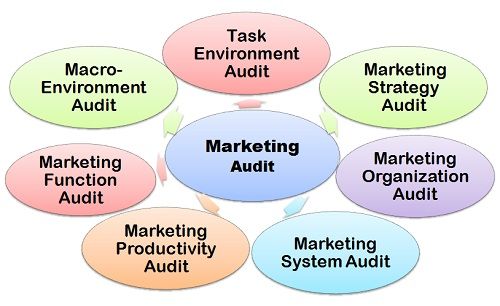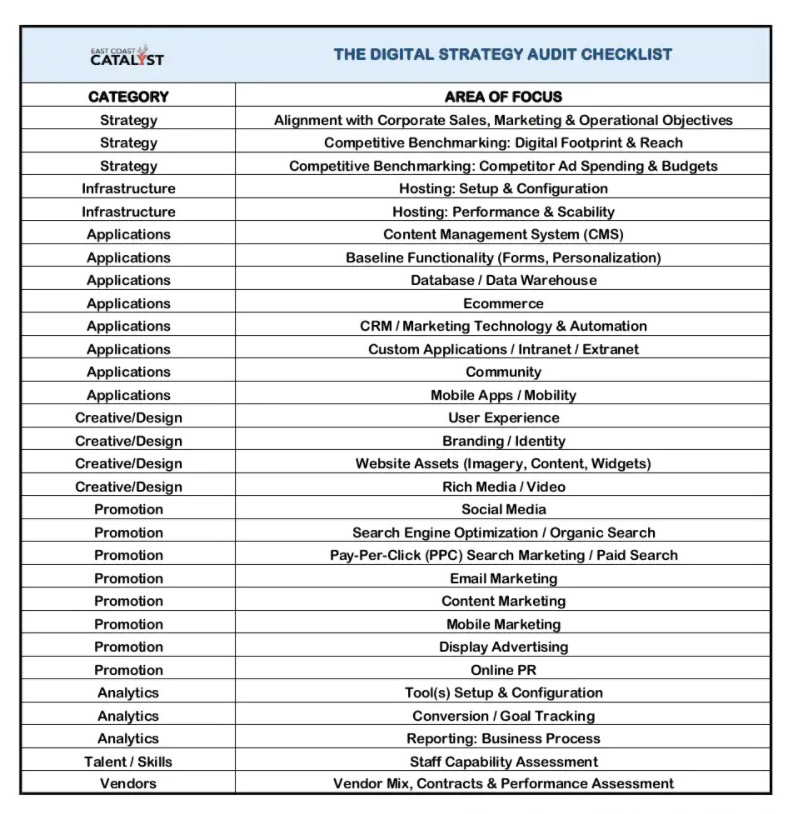Businesses rely on many tools and resources as they strive to understand their audience and find new ways to connect with people. A comprehensive marketing audit is one of the most valuable resources available.
76% of B2B companies had a formal marketing plan in 2020. Having a plan in place is an important first step, but in a rapidly changing market, especially with all the uncertainty during the pandemic, it’s also important to continuously evaluate marketing plans and goals.
Roughly 200,000 U.S. businesses permanently closed in the first year of the pandemic. Companies found themselves needing to adapt to survive. Even during normal years, a marketing audit can identify key areas to improve efficiency, but in a tumultuous post-pandemic market, audits are going to be even more important than they were before.
Quick Takeaways
- A marketing audit is a full-scope internal and external analysis of a business. It exposes any strengths, weaknesses, missed opportunities, inefficient systems, market trends, and more.
- You should conduct a marketing audit for your business to see what isn’t working, realign goals, know the competition, discover strategies, and save time and money.
- A marketing audit needs to be systematic, comprehensive, and regular to become successful.
Video Source
What is a Marketing Audit?
A marketing audit is a full-scope internal and external analysis of a business. It turns your existing marketing strategy inside-out to expose any strengths, weaknesses, missed opportunities, inefficient systems, market trends, and more.
These audits cover a wide range of important marketing aspects, including:
- SEO: Conversions, page rank, click-through rates, organic search traffic, link building
- Branding: Customer ratings, online mentions, product reviews, overall brand awareness
- Website Health: Indexed pages, load speed, journey mapping, user experience
- Social Media: Engagement, followers, leads, mentions, industry influence
- Competitor Analysis: Market share, brand reach, industry position, customer perception
- Offline Marketing: Press features, speaking engagements, word-of-mouth reach, business referrals, trade show leads
A targeted marketing audit focuses on a specific category, whereas a full, comprehensive audit should be as thorough as possible.
Marketing audits are best performed by a third party that is not affiliated or influenced by the organization. Internally conducted audits run the high risk of being biased and skewing the results.

5 Reasons You Should Conduct a Marketing Audit for Your Business
Is your marketing strategy working at maximum efficiency? Are you reaching the right people in the most cost-effective way?
Without regularly conducting audits to assess your marketing plan from every angle, you could be hemorrhaging precious dollars, and nobody likes to waste money. Here are 5 ways a marketing audit can help your business:
1. See What Isn’t Working
Ignorance is not bliss in the business world. If something that costs time and money isn’t serving a greater purpose to your marketing plan, you need to identify, analyze, and replace it with a new tool or strategy.
An audit helps business owners examine all of their marketing activities from an objective point of view. It arms your team with facts, trends, data, and research so they can make informed decisions.
2. Realign Your Marketing Goal, Budgets, and Activities
It’s easy to get bogged down in day-to-day operations and lose sight of the big picture. When that happens, a marketing strategy can easily go off the rails and focus more on sustaining rather than growing.
An audit helps business owners pause, reevaluate their long-term goals, and then examine their current trajectory and marketing plan to see if they’re still on track.
The data-driven approach makes it possible to realign marketing activities and objectives to ensure daily responsibilities are supporting and advancing overall business goals.
3. Know Your Competition
A marketing audit isn’t constrained to only your business. If you’re being thorough, then you’ll also be researching your market, audience, and overall competition.
What are your competitors doing that’s working? How can you stand apart? Are they leaving a gap in the market that you could fill?
3. Discover New Ideas and Strategies
As your audit takes you deep into market and competitor research, you’ll likely discover new ideas along the way.
For example, during your marketing audit, you might study a competitor’s recent social media campaign that had an impressively high engagement rate. With some inspiration and modifications to suit your brand, those techniques could be incorporated into your next campaign.
5. Save Time and Money
Marketing audits aren’t designed to be a one-and-done solution. Rather, they’re meant to continuously measure and reevaluate goals and activities.
Failing to check the pulse of your business can easily lead to time and money wasted on outdated practices, inefficient workflows, and marketing activities that aren’t bringing in ROI. These missed opportunities could eat away at a business’s marketing budget for years before anyone notices.
Regular audits help business owners tweak their strategies so they can work smarter, not harder. You can quickly identify unproductive and underperforming marketing practices and eliminate or improve them.
You can incorporate new strategies based on data, trends, technology, and market forecasts into a business’s marketing plan and save a lot of time and money in the long run.

Ready to Plan Your Business Marketing Audit?
Think of a marketing audit as the captain’s compass keeping a ship on course. For a marketing audit to be successful, it needs to be:
- Systematic: Marketing audits compile data that you will use to make vital business decisions. Taking a thorough, well-organized, systematic approach helps to ensure there aren’t any gaps in the data, which could have a devastating effect on business plans.
- Comprehensive: An audit isn’t meant to be confined to a direct problem you’re already aware of. To truly see the big picture, marketing audits should cover everything. Expanding the audit across all marketing aspects makes it possible to identify problems and missed opportunities that you may have never discovered since they weren’t originally on anyone’s radar.
- Regular: Many businesses think about doing a marketing audit around a big event, such as a rebranding campaign, new product launch, or pricing changes. However, marketing audits are most effective when you do them on a consistent, recurring basis rather than sporadically.
When you plan your marketing audit, remember to include both your short-term and long-term goals in the discussion. These goals should be measurable as well as attainable.
The analysis phase will inspect your current business operations, resources, tools, practices, strategies, budget, and goals. The research phase will analyze the market, customer demographics, trends, economy, forecasts, and competitors.
In the end, a marketing audit will be an invaluable investment for your business. Are you ready to start planning your market audit? Request a FREE consultation to discuss your business goals and see how we can help.

